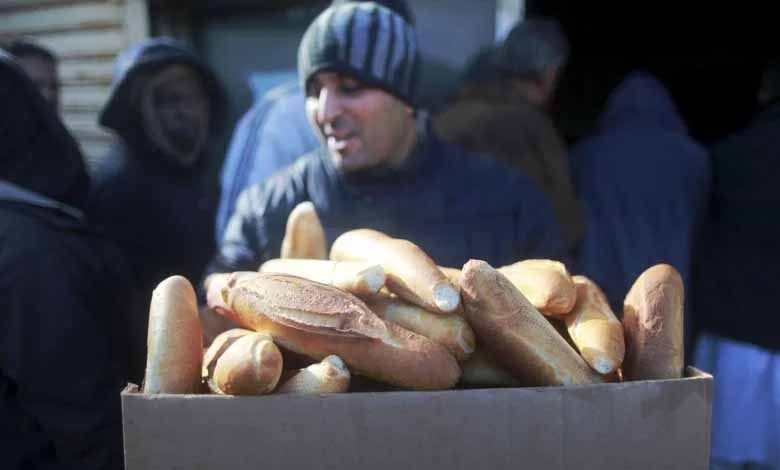The government of reconciliation fears the bread crisis … What is the reason?

Libya’s bread crisis continues to stagnate, amid growing fears from the National Accord government led by Fayez al-Sarraj that the country is entering the maze of a food crisis.
These concerns were manifested by Al-Sarraj’s request to the Central Bank of Libya to accelerate the opening of documentary credits and to give importance and priority to the import of sufficient flour for the needs of the Libyan market, according to a letter sent to the governor of the bank yesterday.
Al-Sarraj warned in his message, which was passed on by local news agencies, that the government could find itself “obliged to intervene to protect the life of the citizen and the security and stability and social peace in using the balance available to the government at the external Libyan bank to deliver this product”.
Al-Sarraj said : “The severe shortage of flour, the stock of which is about to expire, threatens the entry of the country into a food crisis, and this is due to the inaccuracy in the assessment of priorities and of needs by the central bank when opening credits “.
He pointed out that “the last credit opened for this article dates back to August 2020”, despite the limited value allocated to importing flour in exchange for huge sums that belong to other products, which do not represent the same importance for the life of the citizen.
The head of the Presidency Council of the Government of National Accord stressed that the continuation of the situation as is represents a threat to the life of the Libyan citizen, a threat to security and social peace, and announces unforeseen consequences.
On the other hand, in response to these requests, Al Kabeer sent a letter to Al-Sarraj in which he attributed the lack of flour to smuggling and demanded that he control the state borders and ports.
He added : The credits opened in 2020 for the supply of flour are proportional to the amount of usual consumption in the country, indicating that no documentary credits have been opened for the supply of unimportant goods, and that the flour does part of the commodities in the supply.
Further, Al-Kabeer, Al-Sarraj, warned against the interference and liquidation of the state’s foreign exchange balance in the Libyan Foreign Bank, explaining that this balance is linked to sovereign revenues that are present in the bank in violation of the law, and requires their transfer to the sovereign account of the general revenue of the Central Bank of Tripoli.
And he considered that the Presidential Council’s use of this balance was a serious violation of state financial law and public expenditure controls stipulated in the political agreement.
It is noteworthy that this clash between the poles of political and financial power in Tripoli is not the first, as the relationship between the governor of the Central Bank and the head of the Government of National Accord has been tense for two months, due to disagreements over the disposal of oil revenues, which are all deposited in the accounts of the National Oil Corporation in the Libyan Foreign Bank, and a competition to control the economic decision And cash for the country.
In the context, the head of the Supreme Committee for Follow-up of Bakeries, Ali Abdullah Al-Faqir, confirmed the resumption of the work and operation of the bakeries as it was before the lock, “according to what was agreed upon with the Decision Support Office” at the Cabinet Office in the capital, Tripoli, “provided that work and coordination are done with The parties related to the participation of the General Syndicate of Bakeries and Flour Manufacturers in the private sector”, according to what was reported by ”Bawabat Al Wasat” newspaper.
Complaints about the high price of bread
The Food Control Center of the Libyan Government of National Accord announced the agreement to return the price of a loaf of bread to their previous level, and to issue a violation for any bakery that opposes the measure.
The decision came to avoid what observers described as a bread revolution that might erupt in the country at any time, as a result of the widespread tension among Libyans following the sudden increase in the price of the loaf, while the head of the bakeries, Saeed Boukhreiss, accused public and private milling companies of raising flour prices to the highest level, 220 dinars. He said : Those companies raised the prices of materials used in manufacturing, such as yeast, oil, salt and sugar, according to the Libyan newspaper Al-Marsad.
The food control center said : That they decided to revert to the previous price of bread, in a meeting with the general manager of the Mills and Feed Company, the director of the Tripoli municipal guard and members of the bakers, according to the “Africa Gate” newspaper.
The meeting discussed the reason for the recent increase in the price of bread. The “Mills and Fodder” denied taking any action that would raise the price of a loaf of bread, considering that the increase in the price of flour allocated to bakeries is “relative” and does not lead to any increase in the price of a loaf of bread as it is now.
Members of the Food Control Center stressed the need for all bakeries to adhere to standard and sanitary bakery specifications and not to use banned food additives in their manufacture.
The National Accord government’s finance ministry said in a statement : Minister Faraj Bou Matari yesterday examined the situation of bakeries after the rise in flour prices, which led to the increase in the price of a loaf of bread, during a Bou Matari meeting with baker’s captain Saeed Bu Khurais, who devoted himself to discussing the production process in bakeries, the availability of flour and wheat in mills and bakeries, and the possibility accelerate the supply of sufficient stocks.
The statement said that the two sides underlined the importance for bakeries to respect the controls of bread making and their prices determined by the ministry and to monitor their implementation by the control authorities, and the captain announced that there was ongoing communication with bakeries and compliance with these orders.
The head of the bakers captain explained that the mills raised the prices of flour to reach 210 dinars per quintal, equivalent to approximately 47 dollars, after what was sold for 155 dinars, or about 35 dollars per quintal, indicating that “all items related to the bread industry have increased their prices, especially Oil, table salt and yeast ”.
Local activists pointed out that 3 loaves of bread are being sold for one dinar, as the price of bread has increased from a quarter of a dinar to 33 piasters, and the Tripoli municipality has warned the center that the stipulated legal measures will be taken against the manipulators in the price of bread.
Activists added : The high price of bread can push for a popular movement across the country, stressing that the citizen does not have most of the necessary services, and that he only has one loaf of bread left, which is also threatened by failed policies of the Government of National Accord.
Also in the east of the country, the news agency affiliated with the interim Libyan government said: The news of the high price of bread in some bakeries in Benghazi city has aroused the anger and resentment of citizens who are suffering from long period of liquidity shortage and late payment of wages is compensated by the high exchange rate of the dollar, creating a state of deficit from which the citizen suffers.
The agency quoted the official spokesperson for the municipal guard, Captain Ibrahim Al-Talhi, that the agency had received several complaints from citizens about the high price of bread.
For his part, Professor of Economics at the University of Benghazi, Dr. Attia Al-Mahdi Al-Fitori highlighted that the price of a loaf of bread has been on the rise for some time, and the government is unable to monitor and impose a certain price on the bakeries, indicating that the size of the loaf changes, and there is no specific size or weight for it, accusing the Central Bank of Libya In Tripoli, they contributes to raising prices indirectly, by not opening sufficient funds to the market, indicating that the governor of the Central Bank, Siddiq al-Kabeer, is arguing that reserves are rapidly depleted, amid accusations of corruption and favoritism in granting credits.
Al-Fitouri stressed that the stability of the economy is more important than the decrease in the volume of reserves because the reserves are intended to stabilize the economy, in addition to that Libya has reserves that will last for more than 5 years, even if the oil lockdowns are closed, according to him.
In recent days, Libya has experienced a severe shortage of bread, following falling flour stocks and rising prices for bread components, which have resulted in the closure of several bakeries.
Libya consumes 1.3 million tonnes of wheat per year to meet the needs of the local market, of which it imports 75%, after the national wheat production has fallen to 250,000 tonnes, and there are 4,160 bakeries in various parts of Libya, in addition to 57 flour mills.












